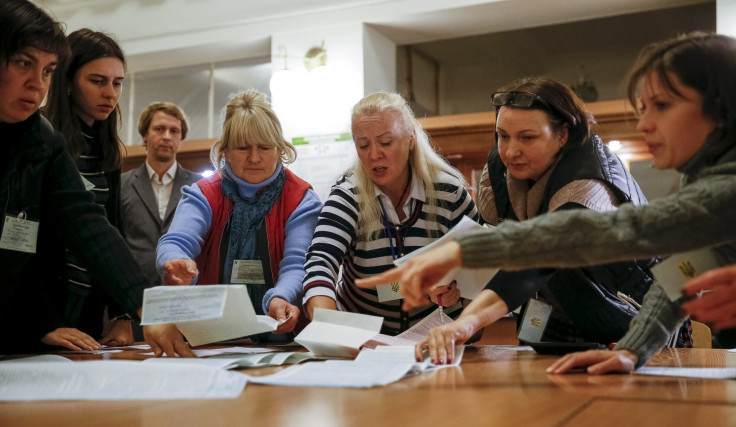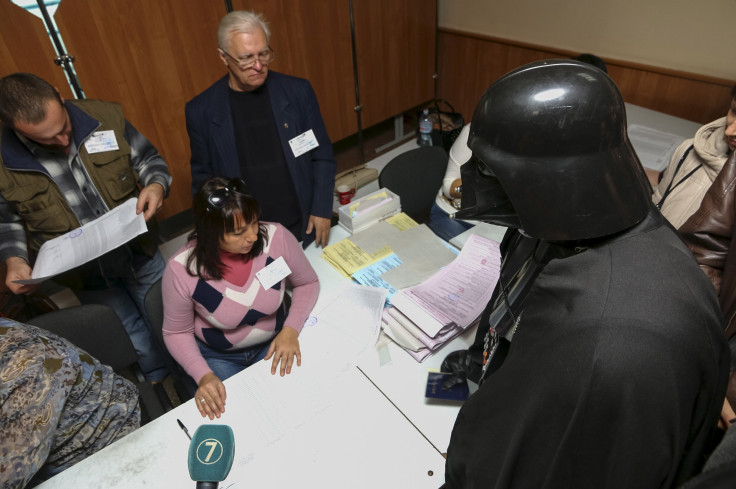Ukraine Election 2015 Update: Voting Results Show Division Between Eastern And Western Part Of The Country

Early results from Ukraine’s local elections held Sunday were beginning to pour in showing an east-west voting divide that has long separated the country of 45 million. The four polls released Monday showed President Petro Poroshenko retaining his support in the west and center of the country, with the Opposition Bloc gaining in the south and east, the Associated Press reported.
"The disposition of forces shows that the country is divided," said analyst Vladimir Fesenko, commenting on the tally of 30 percent of the vote.
Ukraine has traditionally had an east-west voting divide, with citizens in the western parts of the country historically voting for its regional and pro-European Union parties, while the eastern part of the country has largely voted for candidates supporting close relations with Russia. Despite declining poll numbers, Poroshenko managed to maintain support in the west.
The Opposition Bloc is composed of members from the former Party of Regions, which supported President Viktor Yanukovych, who was overthrown in February 2014 following a revolution. Experts said the revolution and ensuing war in the Donbass region that has taken the lives of 8,000 people had slightly moderated the east-west divide.

Overall, the election process was respected, election monitors with the Organization for Co-operation and Security in Europe (OSCE) said. But additional reforms were needed to increase the public’s confidence in elections, the group noted.
“Nevertheless, the complexity of the legal framework, the dominance of powerful economic groups, threats and physical attacks against candidates, and the fact that virtually all campaign coverage in the media was paid for all underscore the need for further reform,” the OSCE’s statement said.
With Ukraine undergoing decentralization, local authorities will gain more power and greater control over budgets, leading to hotly contested elections. Because of the Russian annexation of Crimea in March 2014 and the ongoing war in the eastern Donbass region, more than 5 million voters were unable to participate in the election. The government drew criticism since displaced citizens who were still registered at their former addresses were unable to vote.
Controversy erupted Sunday when elections were not held in the southeastern city of Mariupol. A company owned by oligarch Rinat Akhmetov, a supporter of the Opposition Bloc, had printed the ballots in the city. President Poroshenko tweeted that the failure to hold elections in Mariupol was unacceptable. Elections were also not held in Krasnoarmiisk and Svatove, leading the Opposition Bloc and Poroshenko to blame one another.
Непроведення виборів у Маріуполі неприйнятні. Відповідні зміни до законодавства дозволять нам провести вибори в Маріуполі та Красноармійську
— Петро Порошенко (@poroshenko) October 26, 2015Some results were already available. Kiev Mayor Vitali Klitschko, the former heavyweight boxing champion, won re-election, as did Kharkiv Mayor Hennadiy Kernes and Lviv Mayor Andriy Sadovyi, according to local newspaper the Kyiv Post.
Allegations of vote buying, candidates with similar names and threats of physical attacks were all reported. The full official results of the local elections were expected on Wednesday.
© Copyright IBTimes 2025. All rights reserved.






















